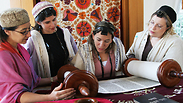
Opposition to female participation culture-based, not halachic
The concern among many Orthodox Jews regarding women's role has less to do with adherence to Jewish law, and more to do with the fear of changes impacting the religious community's nature.
This move has been highly controversial. In the past week, Rabbi Hershel Schachter, head of yeshiva at Yeshiva University, wrote a letter opposing the policy of allowing girls to wear tefillin. Whilst many have delved into the minutiae of Halacha (Jewish law) that either allows or disallows this policy, it seems to me that this debate has a lot less to do with Halacha than it does with the structure of religious society and culture.
There is little doubt that when gender roles start to change, the rule of unintended consequences comes into play. An example was seen this week, when the Pew Research Center reported that in 2012, 21% of women married men who were less educated, which was, according to the Pew Research Center, a "threefold increase from 1960."
Clearly, the women’s liberation movement did not intend for a scenario where educated women would find it difficult to find partners to marry with the same education level. As this phenomena grows, women may find the dating increasingly challenging. To be clear, I’m certainly not suggesting rolling back the positive changes made with regards to women’s rights. However, it is clear that when you make significant changes in the way society functions, the outcomes are often unpredictable.
Where there is rabbinic will, there is a halachic way
The concern amongst many in Jewish Orthodoxy regarding the role of women has less to do with the adherence to Jewish law, and more to do with the fear that changes impact the nature and culture of the religious community as it currently stands. If Orthodox women are given equal opportunities to men with regards to studying Talmud, leadership and teaching, we may find consequences like we have in the general society that women will become greater Torah scholars than the men.It seems that it’s the fear of change and its consequences that drives the debate, not Jewish law, because in many cases where there is a rabbinic will, there is often a halachic way.
Here is one example: About 15 years ago, as Judaism started to grow in the former Soviet Union, synagogues wanted to provide community Passover Seders to Jews in their locale. According to Jewish law, the Seder should not begin until after dark. In some places in the Soviet Union, it does not get dark until past 10 pm and few people in these communities would come to an event that began at 10 pm Thus the dilemma began with the halachic imperative of starting the Seder after dark, and the reality showing that few people would attend a Seder that started so late.
The question was posed and creative halachic minds dealt with the subject, and the order of the Seder was changed around somewhat to accommodate an early start. These styles of Seders are now conducted in the Soviet Union, and I personally use that model for the community Seders I hold here in the United States.
Whilst there is always an argument against the notion, without getting into the details and the sources, upon examination of the relevant law it is clear to me that if there was a rabbinic desire to find a halachic way for greater female participation in religious life, it wouldn’t be at all difficult to find a halachic way.
Thus, those advocating changes to women's roles in Judaism need to first address concerns regarding potential change to religious society and culture instead of wasting effort trying to prove justifiability from the standpoint of Jewish law.
Rabbi Levi Brackman is co-founder and executive director of Youth Directions, a non-profit organization that helps youth find and succeed at their unique positive purpose in life










